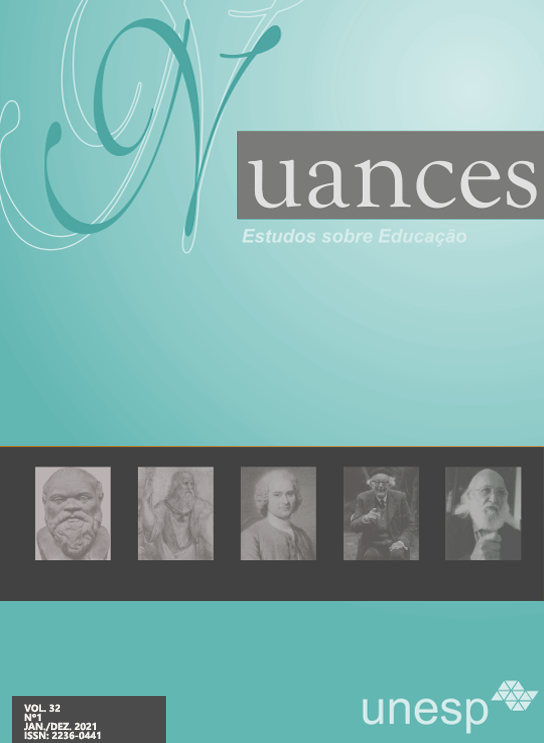The use of educational technologies for training engineering graduates
DOI:
https://doi.org/10.32930/nuances.v32i00.9124Keywords:
Cognitive technologies, Engineering education, Mining engineerAbstract
This article substantiates the need to train mine rescuers in a professional immersive environment with the use of cognitive technologies. It describes the elements of this environment and suggests a four-module model for implementation of cognitive technologies in the training of mine rescue engineers. Special attention is paid to the need for a harmonious addition to the methods of building an educational and practical situation with the techniques of creating an internal learning immersive environment. Cognitive technologies comply with many provisions of the conceive-design-implement-operate (CDIO) standard adopted by the international community and contain a huge field of activity for the development of both traditional and innovative educational technologies. The knowledge gained in the process of theoretical training, coupled with practical experience gained in an immersive educational environment, provide better training of engineering personnel adapted to the performance of their professional tasks and the needs of production.Downloads
References
ADLER, A. Style of life. Moscow: CheRo, 2000.
ANDERSEN, J. R. Cognitive Psychology and its Implications. 5. ed. New York: Worth Publishers, 2002.
BAKIN, M. V. Immersivnye tehnologii v razvitii socialʹnoj èmpatii i obrazovanija [Immersive technologies in the development of social empathy and education]. Meždunarodnyj Naučno-issledovatel’skij Žurnal [International Research Journal], Yekaterinburg, n. 10(100), p. 16-19, 2020. https://doi.org/10.23670/IRJ.2020.100.10.037
CUMMINGS, J. J.; BAILENSON, J. N. How Immersive Is Enough? A Meta-Analysis of the Effect of Immersive Technology on User Presence. Media Psychology, Athens, v. 19, n. 2, p. 272-309, 2016. https://doi.org/10.1080/15213269.2015.1015740
DAVYDOVA, Z. E. Modernization of training of engineers in basic disciplines on the example of studying electrical engineering. In: INTERNATIONAL SCIENTIFIC AND PRACTICAL CONFERENCE MODERNIZATION OF ENGINEERING EDUCATION: RUSSIAN TRADITIONS AND MODERN INNOVATIONS, 2017, Yakutsk. Proceedings […]. Yakutsk: NEFU Publishing House, 2017. p. 192-195.
DUBROVSKAYA, Y. A.; PIKHKONEN, L. V. Professionalʹno-prikladnaja fizičeskaja podgotovka kak osnova dlja formirovanija praktičeskih kompetencij obučajuŝihsja v vuzah silovyh vedomstv (na primere vuzov MČS Rossii) [Professionally Applied Physical Training as the Basis for the Formation of Practical Competencies of Students in the Universities of Law Enforcement Agencies (on the Example of Universities EMERCOM of Russia)]. Obrazovanie. Nauka. Naučnye Kadry [Education. Science. Scientific Personnel], n. 4, p. 174-181, 2019. https://doi.org/10.24411/2073-3305-2019-10213
DUBROVSKAYA, Y. A.; PIKHKONEN, L. V.; RUDENKO, G. V. Organizacionno-metodičeskij opyt praktičeskoj podgotovki studentov-gornospasatelej [Organizational and methodological experience of practical training of students-mountain rescuers]. Uchenye zapiski universiteta imeni P.F. Lesgafta [Scientific Notes of P.F. Lesgaft University], n. 8(186), p. 105-113, 2020. https://doi.org/10.34835/issn.2308-1961.2020.8.p105-113
GONCHAROVA, O.; MOMOT, M. Polnoe pogruženie: kak immersivnoe obučenie prihodit v kompanii i školy [Total Immersion: How Immersive Learning Comes to Companies and Schools]. Рбк [RBC], 2019. Available: https://trends.rbc.ru/trends/education/5d6fb3449a794781b981b437. Access: 24 Mar. 2021.
KORNILOV, Y. V. Immersivnyj podhod v obrazovanii [Immersive approach in education]. Azimuth of Scientific Research: Pedagogy and Psychology, Togliatti, v. 8, n. 1(26), p. 174-178, 2019. https://doi.org/ 10.26140/anip-2019-0801-0043
KRAYUSHKIN, N. Virtualʹnaja realʹnostʹ v obrazovanii [Virtual reality in education]. Graduate School of Business: Center for the development of competencies in business informatics, 2021. Available: https://hsbi.hse.ru/articles/virtualnaya-realnost-v-obrazovanii/. Access: 24 Mar. 2021.
LI, D.; FENG, Y.; CHENG, D.; LU, Y. Exploration and Research on the Engineering Education Model of “Practicing while Teaching with Curriculum Integration”. IOP Conference Series: Materials Science and Engineering, v. 466, 012019, 2018. https://doi.org/10.1088/1757-899X/466/1/012019
POTANINA, O. V. Kognitivnaja kompetencija buduŝego inženera: suŝnostʹ, struktura, soderžanie [Cognitive competence of future engineer: essence, structure, content]. Vestnik Baškirskogo Universiteta [Bulletin of Bashkir University], Ufa, v. 14, n. 1, p. 298-301, 2009.
POTKONJAK, V.; GARDNER, M.; CALLAGHAN, V.; MATTILA, P.; GUETL, C.; PETROVIĆ, V. M.; JOVANOVIĆ, K. Virtual laboratories for education in science, technology, and engineering: A review. Computers & Education, Tempe, v. 95, p. 309-327, 2016. https://doi.org/10.1016/j.compedu.2016.02.002
RADIONOVSKAYA, T. I.; BAEVA, L. S. Praktičeskaja podgotovka kak osnovopolagajuŝij faktor formirovanija professionalʹnyh kompetencij [Practical training as a fundamental factor in the formation of professional competences]. Modern Problems of Science and Education, Moscow, n. 6, p. 973, 2014. Available: http://science-education.ru/ru/article/view?id=17175. Access: 24 Mar. 2021.
SCHEXNAYDER, C.; ANDERSON, S. Construction Engineering Education: History and Challenge. Journal of Construction Engineering and Management, v. 137, n. 10, p. 730-739, 2011. https://doi.org/10.1061/(ASCE)CO.1943-7862.0000273
SERGEEV, S. F. Education in global information-communication and anthropogenic environment: new opportunities and limits. Open Education, v. 1, n. 96, p. 32-39, 2013.
SERGEEV, S. F. Virtual simulators: Problems of theory and methodology of design. Human-Machine Systems, v. 2, n. 8, p. 15-20, 2010.
SERGEEV, S. F.; BERSHADSKY, M. E.; CHOROSOVA, O. M.; SOLOMONOVA, G. S.; ZHOHIKOV, A. V.; GERASIMOVA, R. E.; ZAKHAROVA, N. I.; NIKULINA, A. A.; SAVKIN, P. A. Cognitive pedagogy: E-learning technologies in teacher professional development: Monograph. Yakutsk: Publishing house of the Institute for Humanitarian Research and Problems of Indigenous Peoples of the North, Siberian Branch of the Russian Academy of Sciences, 2016.
TEJEDOR, G.; SEGALÀS, J.; ROSAS-CASALS, M. Transdisciplinarity in higher education for sustainability: How discourses are approached in engineering education. Journal of Cleaner Production, Brno, v. 175, p. 29-37, 2018. https://doi.org/10.1016/j.jclepro.2017.11.085
TVKINORADIO. Immersive environment technology: a combination of the old and the new. Information and technical portal. n.d. Available: https://tvkinoradio.ru/article/article13941-tehnologiya-immersivnoj-sredi-splavstarogo-i-novogo. Access: Mar. 24, 2021.
VESHNEVA, I. V.; SINGATULIN, R. A. Virtual technologies – New perspectives in the learning system. Information Technologies in Education, v. 43, p. 382-387, 2015.
VOROBYOVA, I. M. Strengthening the role of engineering education and the practical component of educational programs in a technical university. Young Scientist, v. 11, n. 91, p. 1304-1307, 2015.
ZAIR-BEK, E. S. The future of education: How immersive technologies will change learning forever. St. Petersburg: The Herzen State Pedagogical University of Russia, 2018.
Published
How to Cite
Issue
Section
License
Atribuição-NãoComercial
CC BY-NC
Esta licença permite que outros remixem, adaptem e criem a partir do seu trabalho para fins não comerciais, e embora os novos trabalhos tenham de lhe atribuir o devido crédito e não possam ser usados para fins comerciais, os usuários não têm de licenciar esses trabalhos derivados sob os mesmos termos.





